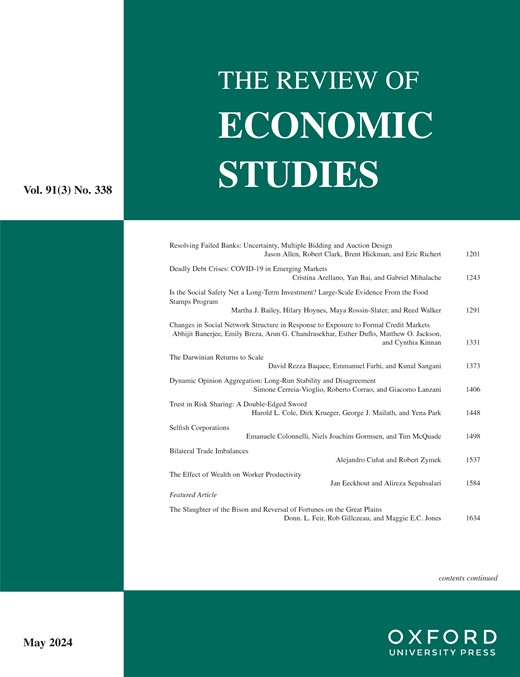Memory and Markets
IF 6.4
1区 经济学
Q1 ECONOMICS
引用次数: 0
Abstract
Abstract In many environments, including credit and online markets, records about participants are collected, published, and erased after some time. We study the effects of erasing past records in a dynamic market where the quality of sellers follows a Markov process, and buyers leave feedback about sellers to an information intermediary. When the average quality of sellers is low, unlimited records lead to a market breakdown in the long run. We consider the information design problem and characterize information policies that can sustain trade and that maximize social welfare. These policies hide some information from the market in order to foster socially desirable experimentation. We show that these outcomes can be implemented by appropriately deleting past records. Crucially, positive and negative records play opposite roles with different intensities and must have different lengths: negative records must be deleted sufficiently late, and positive ones sufficiently early.记忆与市场
在许多环境中,包括信贷和在线市场,参与者的记录被收集、发布,并在一段时间后被删除。在动态市场中,卖方的质量遵循马尔可夫过程,买方将关于卖方的反馈留给信息中介,我们研究了删除过去记录的影响。当卖家的平均质量较低时,从长远来看,无限的记录会导致市场崩溃。我们考虑信息设计问题,并描述能够维持贸易和最大化社会福利的信息政策。这些政策对市场隐瞒了一些信息,以促进社会期望的实验。我们展示了这些结果可以通过适当地删除过去的记录来实现。至关重要的是,正面记录和负面记录在不同强度下发挥相反的作用,并且必须具有不同的长度:负面记录必须删除得足够晚,正面记录必须删除得足够早。
本文章由计算机程序翻译,如有差异,请以英文原文为准。
求助全文
约1分钟内获得全文
求助全文
来源期刊

Review of Economic Studies
ECONOMICS-
CiteScore
10.40
自引率
3.40%
发文量
75
期刊介绍:
Founded in 1933 by a group of young British and American economists, The Review of Economic Studies aims to encourage research in theoretical and applied economics, especially by young economists. Today it is widely recognised as one of the core top-five economics journals. The Review is essential reading for economists and has a reputation for publishing path-breaking papers in theoretical and applied economics. The Review is committed to continuing to publish strong papers in all areas of economics. The Editors aim to provide an efficient and high-quality review process to the Review''s authors. Where articles are sent out for full review, authors receive careful reports and feedback. Since 1989 The Review has held annual May Meetings to offer young students in economics and finance the chance to present their research to audiences in Europe.
 求助内容:
求助内容: 应助结果提醒方式:
应助结果提醒方式:


